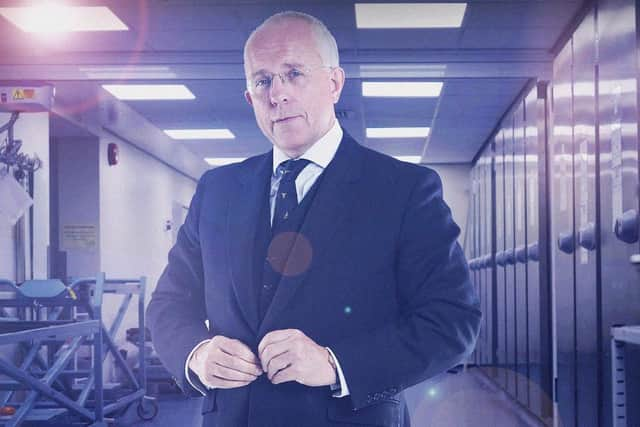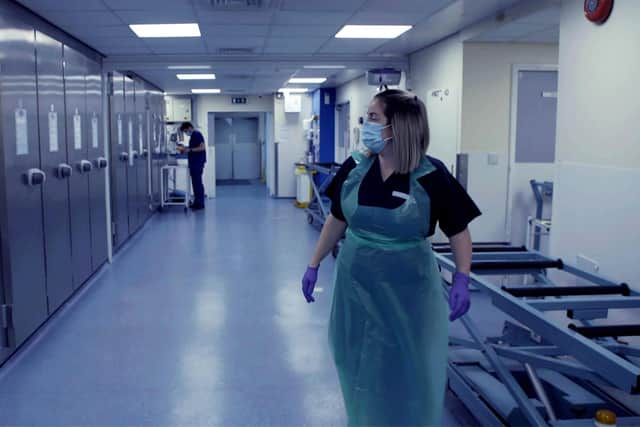Cause of death documentary: "Unusual" fatalities in Lancashire put under the microscope in Channel 5 series exploring the work of the county's coroner, Dr. James Adeley
and live on Freeview channel 276
Dr. James Adeley and his team take centre stage in “Cause of Death”, a four-part series beginning on Channel 5 on Wednesday evening, in which viewers will see for the first time on television the painstaking process undertaken to piece together events leading up to a sudden and potentially unnatural loss of life.
Filmed over the course of six months, the programmes are based on unprecedented access to pathologists performing post-mortems and radiologists conducting and analysing scans – as well as staff at both the Royal Preston Hospital and officers at Lancashire Police.


Advertisement
Hide AdAdvertisement
Hide AdHowever, Dr. Adeley told the Lancashire Post that it was the willingness of the very recently bereaved to be filmed during some of their darkest moments which is amongst the most striking – and surprising – elements of the series.
“They were very welcoming to the TV crews – they invited them to the funerals, they took them to their houses and they would talk about their memories of the person who [had] died.
“This was not what was expected at all [and] I think it’s very brave of them, because they are discussing the loss of someone they have loved, at the moment in time that their grief is at its most intense – and [so] our first reaction was to make sure that there was no pressure from our side [and] we weren’t exploiting them,” said Dr. Adeley, who is responsible for the Lancashire County Council area and Blackburn with Darwen.
Wednesday’s first episode features the story of two elderly men who were found with head injuries, lying semi-conscious in the middle of a road in Leyland. One of the two friends later died, leaving Dr. Adeley and his colleagues to answer the question which defines the work of the coroner’s office – how did it happen?


Advertisement
Hide AdAdvertisement
Hide AdIt was a conundrum with which his companion could offer little help – as he was left without any memory of the moments leading up to their seemingly collective collapse.
Cameras also follow the investigation into the death of a man found under-dressed and unresponsive in a Preston pub garden in the depths of winter – and who subsequently passed away at the city’s hospital. He had no phone or wallet with him, meaning that his identity – as well as his death – were both initially a mystery.
Dr. Adeley says that the nine cases which appear throughout the series all have “unusual” features. However, he hopes that the finished programmes do more than provide intriguing viewing.
“When I started this [programme], it was to try and explain work that most people don’t know anything about [and] that they will only come to know about at the worst moments of their lives – providing some sort of explanation as to who we are and what we do and [letting people know] that their loved one who’s died, when they go the mortuary, will still be treated as a person, that we will take their death seriously [and] investigate.
Advertisement
Hide AdAdvertisement
Hide Ad“I’m rather hoping that families will be reassured that [such] a service does exist, that we do take care of their loved ones, we do take into account their views and we treat the whole [process] very seriously and with as much compassion as we can bring to bear.”
Lancashire County Council’s cabinet member for community and cultural services, Peter Buckley – who is ultimately responsible for the coroners service in the area – said that the documentary was “groundbreaking”.
“I am very proud that Lancashire County Council, through our coroner’s office and working alongside our colleagues in the NHS and police, were able to provide access to an area of public service that has never been seen by the public before.
“As well as being an informative and important piece of public service broadcasting, each film highlights individual human stories that are both moving and heart-breaking. I am extremely grateful to the families of those people featured for allowing the documentary makers to tell their loved ones’ stories,” County Cllr Buckley said.
Advertisement
Hide AdAdvertisement
Hide AdDetective Chief Inspector Jane Webb, from the Force Major Investigation Team at Lancashire Police, said that the series will show “the work that happens daily across Lancashire to support grieving families and give them answers when a loved one dies suddenly”.
She added: “It also demonstrates the professionalism and sensitivity shown by everyone – from the Coroner and his officers to police and NHS staff – during some tragic circumstances.
“We are proud to have been a part of it and thank all the families for their support.”
Cause of Death – produced by Candour Productions – begins at 9pm on Wednesday on Channel 5.
LEARNING LESSONS FROM FATAL MISTAKES
Advertisement
Hide AdAdvertisement
Hide AdAs well as deaths that result from unforeseeable tragedies, coroners also often find themselves investigating fatalities that have arisen from events that could, potentially, have been avoided.
In the latter scenario, the question for the bereaved might well be one of ‘why’ rather than ‘how’.
For Dr. Adeley, a key responsibility in such situations is to try to ensure that what he and his team uncover means that the same errors are not repeated – by either public or private sector organisations.
“With any inquest, we can write a…report which is drawing to somebody’s attention that there is a problem and they need to take action. With the relationships we have with the [NHS] trusts around here, we don’t tend to write very many, because the trusts are sufficiently good…that they have already put in place all the learning and started to educate the staff before it comes to inquest.
Advertisement
Hide AdAdvertisement
Hide Ad“What we try [to] encourage anybody who’s coming to court to do is to identify what went wrong and put in place steps that would help to prevent [it] from happening again.
“Because families want the death of a loved one to stand for something – and if the trust or the police or the ambulance service can say, ‘We’ve changed our processes – we’re trying to make sure this doesn’t happen again’, that is very important for families.”
Dr. Adeley also spoke of the coroner’s concern for those caught up in investigations and inquests – and the need to strike a “balance” between such individuals and the families who have lost someone close to them as a result of the failings of another.
“If you’ve got a junior doctor who’s made a mistake, he will be carrying that mistake with him – and we’ve got to get him through the inquest process, so that [he] can go back to work.
Advertisement
Hide AdAdvertisement
Hide Ad“We tend to deal with certain services time and time again – healthcare, the police, the ambulance service. [But] the people who are providing that service, none of them went to work on that day and thought, ‘Well, I’m going to screw this up’.
“Most of the time, it’s not a question of, ‘I can’t be bothered’ – it’s simply that they didn’t appreciate [something] and all the holes in the Swiss cheese line up on that one occasion and the worst happens.
“It’s trying to get them through it so that they can go back and pass on that knowledge to their colleagues so it doesn’t happen again.”
WHAT DOES THE CORONER DO?
Coroners operate within a legal framework and have a duty to investigate all deaths where the cause is unknown, as well as violent or unnatural deaths and deaths that occur in custody.
Advertisement
Hide AdAdvertisement
Hide AdThe coroner investigates in order to establish who, where and when a person died – and how. It may be necessary for a CT scan, or, more rarely, a post-mortem examination to be carried out to determine the cause of death.
Certain deaths require an inquest that will be conducted in a local court by the coroner.
Deaths that need to be reported to the coroner
The registrar will report the following deaths to the coroner if not already reported to by someone else:
***where there is no doctor who can issue a medical certificate of cause of death
Advertisement
Hide AdAdvertisement
Hide Ad***where the deceased was not seen by the doctor issuing the medical certificate either after death or within 28 days before the death
***where the cause of death is unknown
***where the cause of death is believed to be unnatural or suspicious
***where the death occurred during an operation or before recovery from an anaesthetic
***where the death is due to industrial disease or industrial poisoning
Advertisement
Hide AdAdvertisement
Hide AdAn inquest is not a trial and it is not the coroner’s job to deal with questions of civil or criminal liability. Possible conclusions include: natural causes, accident, suicide, unlawful or lawful killing, industrial disease, and open conclusions, where there is insufficient evidence for any other conclusion. Narrative conclusions, which are a short statement of facts found proved, can also be made.
Source: Lancashire County Council
